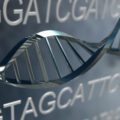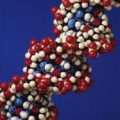
A team of McGill University scientists have discovered important differences between the brains of suicide victims who suffered abuse as children and so-called normal brains. The differences are in their epigenetic marking – a chemical coating on the DNA that is influenced by environmental factors.
Epigenetic changes do not involve changes in the actual DNA, which remains fixed throughout life and is identical in every part of the body. During gestation, however, the genes in our DNA are marked by a chemical coating called DNA methylation. These marks are sensitive to one’s environment, especially early in life. The epigenetic marks punctuate the DNA and program it to express the right genes at the appropriate time and place.
Writing in the journal PLoS ONE, McGill’s Moshe Szyf explained how his team examined a set of genes that code for rRNA, a basic component of the machinery that creates protein in cells. Protein synthesis is critical for learning, memory and the building of new connections in the brain; it can affect decision-making and other behavior. Szyf found that rRNA can be regulated epigenetically.
“It’s possible the changes in epigenetic markers were caused by the exposure to childhood abuse, although in humans it’s difficult to establish causality between early childhood and epigenetic markers, in the way we have established this in animal subjects,” said Szyf. “The big remaining questions are whether scientists could detect similar changes in blood DNA – which could lead to diagnostic tests – and whether we could design interventions to erase these differences in epigenetic markings.”
Related:
Zeroing-In On Epigenetic Inheritance Mechanism
Epigenetic Changes Found In Schizophrenics
Inherited Disease Findings Stir Evolutionary Debate








Comments are closed.